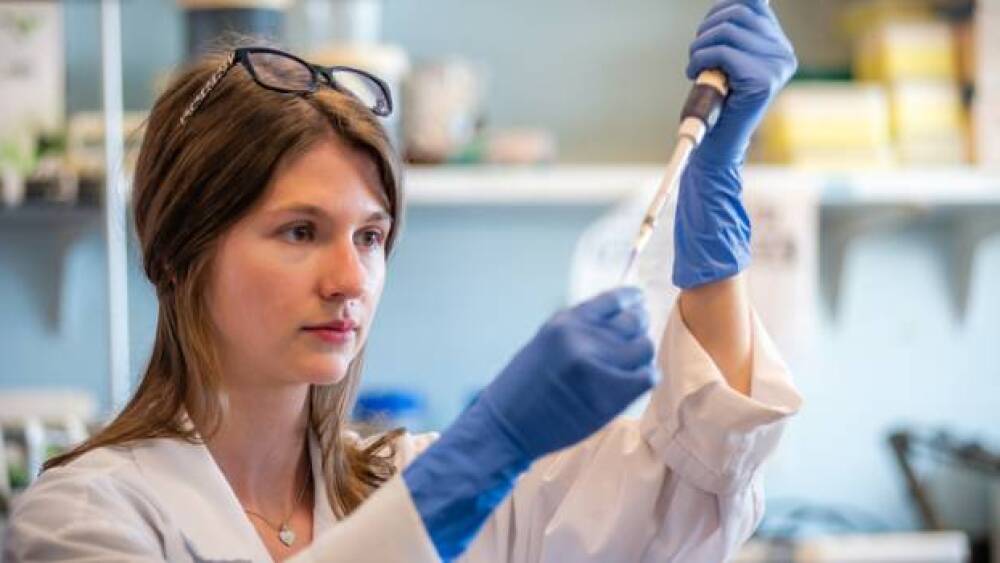As the American Association of Cancer Research (AACR) Annual Meeting wraps up, there were some surprising and exciting research news and presentations.
As the American Association of Cancer Research (AACR) Annual Meeting wraps up, there were some surprising and exciting research news and presentations. Here’s a look.
Victoria’s Secret and Pelotonia Present Five Female Cancer Researchers with $100K Awards
The Victoria’s Secret Global Fund for Women’s Cancers 2022 Meritorious Awards, in partnership with cancer charity Pelotonia and the AACR, presented five female cancer researchers with scientific achievement awards of $100,000 each. This was the inaugural award provided by the fund, which will award $5 million annually to women scientists studying women’s cancers. Since 2011, Victoria’s Secret has raised $21 million for cancer research.
The winners are:
• Joan S. Brugge, Ph.D., Harvard Medical School, for breast cancer research.
• Dr. Susan M. Domcheck, M.D., University of Pennsylvania, for genetic testing for high penetrance breast cancer susceptibility genes.
• Dr. Karen H. Lu, MD, The University of Texas MD Anderson Cancer Center, Houston, for fundamental research of endometrial cancer in Lynch Syndrome.
• Dr. Lisa A. Newman, M.D., MPH, New York-Presbyterian/Weill Cornell Medical Center, New York, for the etiology of breast cancers in African and African American women.
• Dr. Martine J. Piccard, M.D., Ph.D., Universite Libre de Burxelles, Brussels, Belgium, for advancing breast cancer clinical trials and drug development.
“We have long supported cancer research, but this particular program - accelerating innovation in cancer research for women, by women - is a tangible way we’re bringing to life our brand’s vision of being a leading advocate for women,” said Christy Tostevin, senior vice president of communications and community relations, Victoria’s Secret. “We are exceptionally proud to share The Fund’s inaugural award with five outstanding women who have been leading this critically important work for decades, and are inspiring the next generation of women leaders in cancer.”
AbbVie Myelofibrosis Drug Hints at Success in Potential Biomarker
Chicago-headquartered AbbVie shared results from the Phase II REFINE trial of navitoclax alongside Novartis and Incyte’s JAK inhibitor Jakafi (ruxolitinib) in patients with myelofibrosis who did not respond well to Jakafi alone. This was a dose-ranging study with 32 evaluable patients. Of them, 38% demonstrated improvement in bone marrow fibrosis of at least one grade. Navitoclax also hit a 20% reduction in driver gene variant allele frequency (VAF), a potential biomarker for cancer. This data is not yet mature enough to determine if the drug is having an impact on survival. However, the median overall survival (OS) for the patients receiving navitoclax was 28.5 months.
“Disease control with reversal of bone marrow fibrosis is a key objective for improving patient outcomes,” said Dr. Mohamed Zak, M.D., Ph.D., vice president and global head of oncology clinical development at AbbVie. “That’s why we are especially pleased about these early results of navitoclax in combination with ruxolitinib that indicate its novel mechanism of action of inducing cell death may cause reversal of bone marrow fibrosis and extend survival for patients who respond to treatment.”
Trishula’s Encouraging Antibody-Combo for Gastric Cancer
South San Francisco-based Trishula Therapeutics presented promising early Phase Ib trial data of TTX-030 in combination with an investigational anti-PD-1 antibody, budigalimab, and FOLFOX chemotherapy for first-line treatment of patients with locally advanced/metastatic HER2-negative gastric or gastroesophageal junction cancer. The drug combination was generally well-tolerated and demonstrated encouraging anti-tumor signals. TTX-030 is a first-in-class, anti-CD39 antibody Trishula is developing with AbbVie. Budigalimab is being developed by AbbVie.
“The response rates including in patients with PD-L1 low tumors seen in this preliminary analysis are very encouraging and support the potential of TTX-030 to impact the standard of care for patients with gastric and gastroesophageal cancer,” said Dr. Zev Wainberg, M.D., professor of medicine at UCLA and co-director of the UCLA GI Oncology Program.
CoVac-1 COVID-19 Vaccine May Help Cancer Patients with B-Cell Deficiencies
CoVac-1 is a new vaccine against COVID-19, and in clinical studies the peptide-based vaccine candidate induces robust immune response against SARS-CoV-2. Of note is that most approved vaccines don’t induce strong immune responses in people who are immunocompromised, such as cancer patients. Researchers at the University Hospital Tubingen in Germany conducted a study of CoVac-1 on cancer patients who had B-cell deficiencies, typically because chemotherapy or immunotherapy destroyed B cells, which are responsible for antibody-mediated immune responses.
“To our knowledge, CoVac-1 is currently the only peptide-based vaccine candidate specifically developed and evaluated for immunocompromised patients,” said Dr. Juliane Walz, M.D., senior author of the study and a professor of peptide-based immunotherapy at the UHT.
The research group is preparing a Phase III trial of CoVac-1 in a larger group of immunocompromised patients. The hope is that the vaccine will protect cancer patients with B-cell deficiencies from severe COVID-19.





